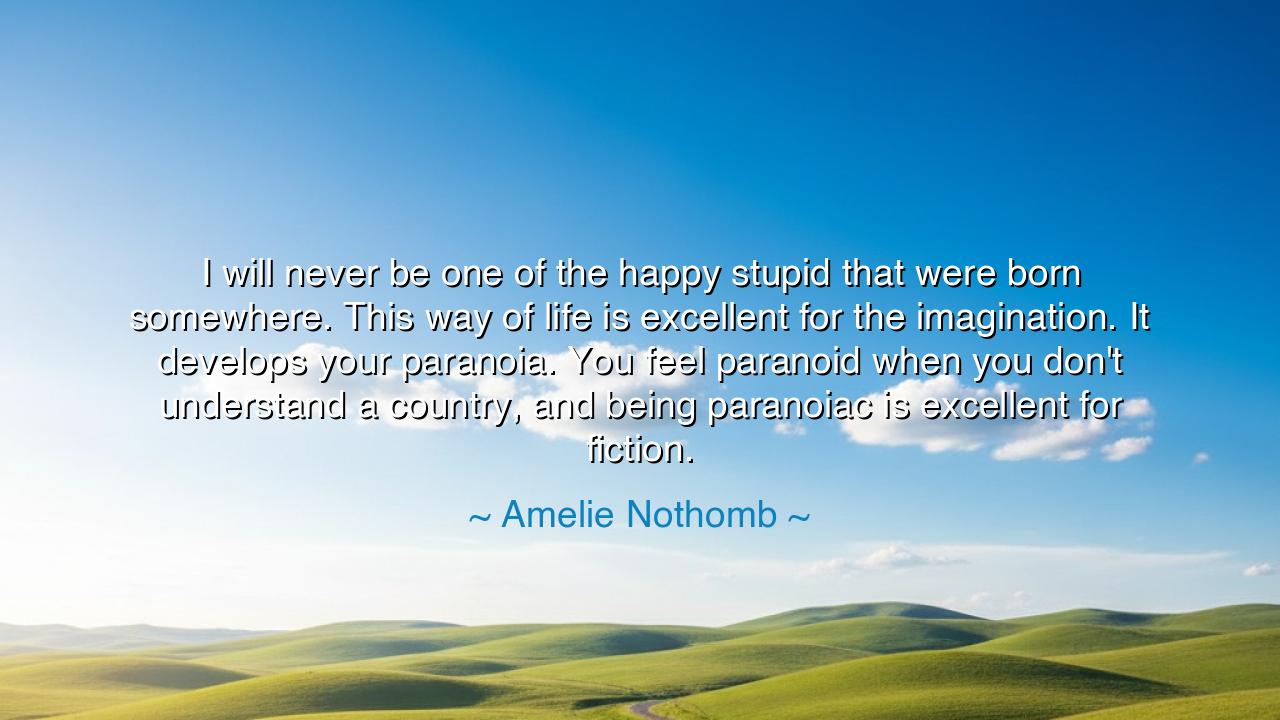
I will never be one of the happy stupid that were born somewhere.
I will never be one of the happy stupid that were born somewhere. This way of life is excellent for the imagination. It develops your paranoia. You feel paranoid when you don't understand a country, and being paranoiac is excellent for fiction.






“I will never be one of the happy stupid that were born somewhere. This way of life is excellent for the imagination. It develops your paranoia. You feel paranoid when you don't understand a country, and being paranoiac is excellent for fiction.” Thus spoke Amélie Nothomb, the Belgian novelist whose mind dances on the border between absurdity and insight, between exile and belonging. Her words, at once sharp and luminous, reveal a truth known to all seekers of the human spirit: that displacement, alienation, and even paranoia can become the fertile soil of imagination. In this saying, she transforms unease into power, confusion into creation, reminding us that the soul grows not in comfort, but in the fire of strangeness.
Born in Japan to Belgian parents, Nothomb spent her youth wandering between worlds — never entirely of one place, never entirely apart. She knew what it meant to be the stranger, to walk among customs that spoke another language of the body and soul. For many, such a life breeds rootlessness, a longing for simplicity. But for her, it became a source of wonder and tension — the spark that ignites the imagination. To “never be one of the happy stupid that were born somewhere” is to refuse the dullness of certainty. It is to live in the in-between — where questions bloom, where every glance and gesture must be deciphered, and where the mind is always awake.
Her words speak to an ancient truth: creation is born from discomfort. The poet, the philosopher, the artist — all are wanderers between realities, driven by the ache of not belonging. When Nothomb calls this way of life “excellent for the imagination,” she does not mean pleasant; she means potent. For it is when we are strangers to our surroundings that our inner world begins to speak louder. In the tension between understanding and confusion, the mind begins to create bridges — stories, meanings, fictions — to make sense of what the heart cannot grasp.
The ancients knew this mystery well. Consider Odysseus, the eternal wanderer of the Greek world. Torn from his homeland, tossed by the will of gods and seas, he lived forever on the edge of belonging. Yet from his trials sprang the Odyssey — not a tale of comfort, but of longing, cunning, and the endless search for home. Like Nothomb, Odysseus was paranoid in the truest sense — ever-watchful, ever-questioning, never at peace with what he saw. And in that vigilance, he became not a victim of exile, but its poet. Paranoia, in Nothomb’s vision, is not madness but awareness sharpened by dislocation — the artist’s constant readiness to see hidden meaning in the world.
To feel paranoid, to live in a state of uncertainty, is to be alive to mystery. The one who “understands” everything too quickly falls asleep within their own familiarity. But the one who does not understand, who feels the strangeness of existence, becomes attentive to every sign, every silence. This is the seed of fiction, for the storyteller is always the one who sees the invisible connections others overlook. Out of her unease, Nothomb builds worlds — absurd, tender, and luminous — where the foreign and the familiar collide. Her fiction is not an escape from paranoia, but its transformation into meaning.
There is a strange holiness in what she says. For to “be born somewhere” — to belong too completely — can make one blind to the wonder of being alive. It is the outsider, the one who never feels at home, who sees the world in its full strangeness. The great artists of all ages have lived in such exile — Kafka in his own city, Van Gogh in his own time, Frida Kahlo within her own skin. Each turned alienation into beauty. Each proved that the mind, when pressed by the discomfort of not belonging, can give birth to universes.
So let this be your lesson, O seeker of meaning: do not fear dislocation. When you feel estranged, uncertain, or misunderstood, know that you stand in the place of creation. Do not long to be “one of the happy stupid that were born somewhere.” Instead, be one of the awake — those who use their discomfort as a lamp. Let your imagination gallop through confusion. Let your paranoia sharpen your sight, turning fear into insight. For the world is never truly known — it is only imagined, and it is through that act of imagining that we make it beautiful.
Thus, Amélie Nothomb’s words remind us that to be an outsider is not a curse but a calling. The imagination thrives where certainty dies. The one who does not fully belong becomes the bridge between worlds — the one who sees what others cannot see, and writes what others cannot say. So, embrace your strangeness, and transform your paranoia into vision. For in that sacred tension between confusion and creation, the artist — and indeed, the human soul — finds its true home.






AAdministratorAdministrator
Welcome, honored guests. Please leave a comment, we will respond soon